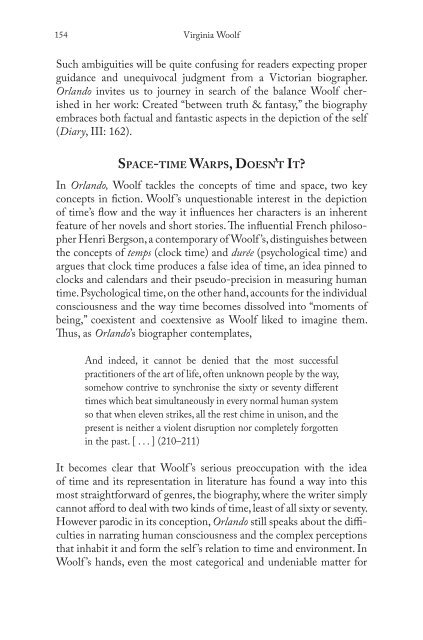Blooms Literary Themes - THE TRICKSTER.pdf - ymerleksi - home
Blooms Literary Themes - THE TRICKSTER.pdf - ymerleksi - home
Blooms Literary Themes - THE TRICKSTER.pdf - ymerleksi - home
Create successful ePaper yourself
Turn your PDF publications into a flip-book with our unique Google optimized e-Paper software.
154<br />
Virginia Woolf<br />
Such ambiguities will be quite confusing for readers expecting proper<br />
guidance and unequivocal judgment from a Victorian biographer.<br />
Orlando invites us to journey in search of the balance Woolf cherished<br />
in her work: Created “between truth & fantasy,” the biography<br />
embraces both factual and fantastic aspects in the depiction of the self<br />
(Diary, III: 162).<br />
SPACE-TIME WARPS, DOESN’T IT?<br />
In Orlando, Woolf tackles the concepts of time and space, two key<br />
concepts in fi ction. Woolf ’s unquestionable interest in the depiction<br />
of time’s fl ow and the way it infl uences her characters is an inherent<br />
feature of her novels and short stories. Th e infl uential French philosopher<br />
Henri Bergson, a contemporary of Woolf ’s, distinguishes between<br />
the concepts of temps (clock time) and durée (psychological time) and<br />
argues that clock time produces a false idea of time, an idea pinned to<br />
clocks and calendars and their pseudo-precision in measuring human<br />
time. Psychological time, on the other hand, accounts for the individual<br />
consciousness and the way time becomes dissolved into “moments of<br />
being,” coexistent and coextensive as Woolf liked to imagine them.<br />
Th us, as Orlando’s biographer contemplates,<br />
And indeed, it cannot be denied that the most successful<br />
practitioners of the art of life, often unknown people by the way,<br />
somehow contrive to synchronise the sixty or seventy diff erent<br />
times which beat simultaneously in every normal human system<br />
so that when eleven strikes, all the rest chime in unison, and the<br />
present is neither a violent disruption nor completely forgotten<br />
in the past. [ . . . ] (210–211)<br />
It becomes clear that Woolf ’s serious preoccupation with the idea<br />
of time and its representation in literature has found a way into this<br />
most straightforward of genres, the biography, where the writer simply<br />
cannot aff ord to deal with two kinds of time, least of all sixty or seventy.<br />
However parodic in its conception, Orlando still speaks about the diffi -<br />
culties in narrating human consciousness and the complex perceptions<br />
that inhabit it and form the self ’s relation to time and environment. In<br />
Woolf ’s hands, even the most categorical and undeniable matter for

















